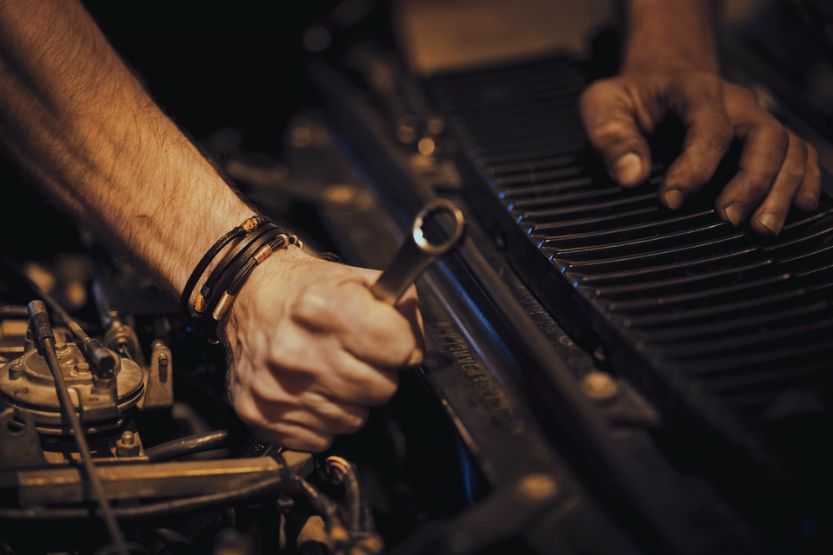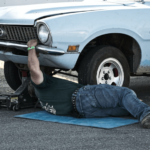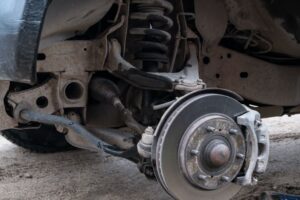The American Automobile Association says that the average cost of an unexpected car repair is around $550. How do mechanics arrive at this cost? In this article, I’ll discuss the mechanic labor rate guide – how much do they charge?
The hourly mechanic labor charge is between $80 and $100. Mechanic labor costs this much because you are paying for the mechanic’s knowledge, skills, and experience, which they can only acquire through many years of learning and training.
What goes into a mechanic’s labor charges? The first thing that a mechanic does is to diagnose the problem. This is called diagnostic labor. It requires more training than what is needed in actual repair work. After they have diagnosed the problem, they perform the required repairs.
Read on to learn more about the cost of labor car mechanics usually charge for car repairs and maintenance.
Mechanic Labor Rate Guide Overview

How Much Do Mechanics Charge per Hour?
The average hourly mechanic labor rate ranges from $80 to $100.
Labor charges for mechanics cost this much because customers are paying for the mechanic’s knowledge, experience, and expertise which can only be acquired through long years of education and training.
Mechanic Labor Charge Includes the Diagnostic and Actual Repair Work
Generally, two things go into a mechanic’s labor charge. The first one is for diagnostic labor. This ability requires considerable training as well as the use of diagnostic tools. It is much more important than doing the actual repairs.
Actual repair work is the second thing that goes into the labor charge of a mechanic. To do effective repair work also requires considerable training and experience. It will take years before a car mechanic can perform quality repair work.
Labor Rates Vary Across the United States
The mechanic labor rates vary widely across the United States. They can also vary widely within the same city. According to the AAA’s Approved Auto Repair network, the mechanics’ hourly labor charge ranges from $47 to $215.
The actual labor charge is typically based on the car repair shop’s cost of doing business.
Depends on Many Factors
Labor charges are determined by the labor time, which is the time the mechanic spent fixing the vehicle. It is also based on the standard guidelines set by the industry. A question naturally arises: What should cost more, labor or parts?
There is no straight answer to this question because the scenarios in car repairs cannot be standardized. In the car repair and maintenance industry, there is a parts-to-labor ratio.
If the parts-to-labor ratio is less than 1, the car repair shop makes more profit in its repair work than in the parts they sell. This means the shop is not making money for the parts they use.
In other words, some shops are doing labor-intensive repair services that do not require much selling car parts.
How Car Shops Determine Their Mechanic’s Labor Charges
The average mechanic labor charge of $80 to $100 is based on certain national labor guides published every year.
These guides have conducted surveys on the labor charges of mechanics all over the United States. The figures they come up with and the average amount of time to do the repairs are based on these surveys.
In the real world, the actual repair jobs that a car requires may not just be the particular problem that the car owner asks the car shop to perform. For instance, if a car owner drives his car to a repair shop and the mechanic discovers that it is a water pump problem upon initial examination.
So, the shop says it will take two and a half hours to do the job. The cost will be around $60. However, as the mechanic tries to fix the problem, they run into other issues related to the initial problem.
The mechanic discovers that all the bolts are rusted, and the coolant has already gone bad. So, to do the water pump repairs and make it function efficiently, they also need to fix the bolts and replace the coolant.
That will take additional labor time and parts, which means extra labor and parts costs. So, you can now see why labor charges of mechanics around the country vary so widely.
Why Is Mechanic Labor So Expensive?
You may wonder how much of the labor cost a car repair shop charges goes into the mechanics’ pocket.
Includes the Cost of Running a Car Repair Shop
This arrangement of car repair shops also varies widely across the country. Some car shops pay their mechanics straight by the hour, while others pay their mechanics depending on the total hours they put in per week.
If you are the customer, paying $100 for car repairs may be too high. However, you need to consider the cost of running a car repair shop. There are many things required to operate a car repair shop successfully.
Salary of the Shop’s Staff
The owner of a car repair shop needs to think about the salaries of the mechanics and administrative staff. Aside from that, they also need to pay their workman’s compensation, benefits, and similar stuff.
And then, the owner has to pay the rent and utilities such as water, electricity, gas, etc. They also have to pay for the training and education of their mechanics if they want the shop to be tuned with the times.
Mechanic’s Tools and Additional Training
Independent mechanics also have their expenses to think about. Becoming a competent mechanic is very expensive. They have to put themselves into school to learn the ropes. After schooling, they have to gain experience in the actual world of car repairs.
They also need to continue to upgrade their knowledge by taking advanced car tech repair courses to keep abreast with the ever-changing and upgrading car technologies. Add to these; they must equip themselves with the required tools and equipment for the job.
An average independent mechanic should have around $25,000 worth of tools to be effective in their job. These things go into the labor charge of a car mechanic operating independently.
How Do Mechanics Know What to Charge?

So that they can stay in business, car shops need to compute their repair cost judiciously. It is not as simple as adding the price of parts to the labor charges. They need to make a profit for every repair job to stay afloat. How do they compute their repair quotes?
1. Calculate How Long the Repair Will Take
Labor cost constitutes a significant amount of the total cost of car repairs. So, car shops are very careful in calculating their labor costs to ensure that their repair quotes are accurate.
They consider that more complicated car problems require more complex repairs that will take longer to complete.
As a car owner, you can refer to a car repair labor guide or a mechanic labor rate calculator as your guide if you are not sure how long the repair job will take. Here is a website that can help you estimate the cost of labor and repair for your particular vehicle.
But be aware that the amount of time is usually only half of the labor charge because the shop has to set an hourly rate for the repair job that needs to be done.
2. Compute the Labor Rates for the Required Repairs
The car shop needs to estimate the minimum labor charge to see the amount by which they can break even. They call this amount their shop rate. They add up all their monthly expenses to arrive at their break-even amount. Then they divide the total amount by the number of hours their mechanics work.
So, if the overhead of the shop is $11,000 and the mechanic works 40 hours a week, the shop rate is:
- $11,000/4 weeks = $2,750.00 per week
- $2,750.00/40 hours per week = $68.75 per hour
For the car shop not to lose money on the job and cover all its expenses, they need to quote a mechanic labor charge of $68.75 per hour. But with this labor charge, the car shop will only break even.
It has to make money out of business. So, the car shop has to add a certain percentage to this amount to make a profit. The industry recommendation is for the shop to include a markup ranging from 50% to 60% of this hourly rate.
So, adding 50% to 60% to $68.75, the car shop will quote a labor cost ranging from $103 to $110 per hour.
As a backgrounder, the average hourly rate of auto dealers can range from $75 to $130 per hour. The profit margins of auto dealers are usually higher than independent car mechanics.
That’s only natural because the labor rates of auto dealers are higher by 20% to 25% compared to independent car repair shops and car mechanics.
3. Add the Costs of Parts and Materials
Labor is just a part of the total cost of car repairs. Also included is the price of parts and materials. These could include replacement parts, screws, sandpaper, car paint, etc.
Car shops usually increase their discounted costs so that the customer will only pay for the cost of parts and materials, just as if they bought the parts themselves.
Car shops also refer to state regulations to stay within the pricing laws for auto repairs and replacement parts.
4. Estimate the Labor Costs of the Required Repair
Car shops calculate their labor charges by multiplying the estimated length of time the repair will take by their auto mechanic labor rate. The resultant amount is their total labor cost.
In this amount, they include their markup to get their profit. As I’ve mentioned, the standard industry markup can range from 50% to 60% of the labor cost.
Again, how much is a mechanic labor rate? A mechanic’s average labor rate is between $80 and $100. Note that the dealership rate is higher than other repair shops.
How to Estimate the Labor Charge for Auto Repair
On average, the labor rate for auto repairs ranges from $75 to $130 per hour. Most car shops try to strike a balance between accessibility and profit. It is useless to have a high labor rate to gain more profit if you drive away customers from your car shop.
But it is also foolish to set your hourly rates too low to attract customers. It is also useless to have many customers, but you cannot even break even in your car repair business. And to break even is not what car repair shops are in business for. They are also in this business to make a profit.
So, what’s the fair amount for a mechanic’s labor?
No hard and fast rule will help determine a fair amount for the work done by a car mechanic. It depends on many factors, one of which is the market average for labor rates in your location.
The rule of thumb of adding 50% to 60% of your labor cost is a good practice. This business approach will ensure that a car shop will not lose money and will not price itself out of the market.
If you want accurate world information about mechanic labor rates in the United States, here is a mechanic labor rate chart that shows the mechanic labor charges for car repairs related to check engine light.
Factors that Affect Mechanic Labor Rates

I have already touched on one factor that affects mechanics’ labor rates. Several factors must be considered before a car repair shop can set its repair labor charges. The factors that affect mechanic labor rates are the following:
1. Labor Rates in the Area
Business owners should follow the industry’s labor rates set by the government. So, car shop owners must comply with the minimum labor rates prescribed by the department of labor as they relate to their business.
2. Labor Costs
Labor costs will be different for car repairs and car maintenance. Car repairs are much more complicated than car maintenance since it involves diagnosing the problem’s cause and performing the required repairs.
Maintaining a car is straightforward and does not require much diagnosing the problem.
3. Vehicle Make and Model
SUVs cost more to repair than ordinary sedans. On average, bigger cars also cost more to repair than smaller cars. Late model cars were more expensive to repair than carbureted vehicles manufactured in the 1960s and 1970s.
4. Mechanics’ Experience
The types of mechanics in a car shop can also dictate the labor charges of that shop.
For instance, if the shop employs well-experienced graduates and is fully certified by top schools for mechanics, you can expect their labor rates to be much higher than the local car repair shop on the corner.
5. Type of Car Service Shop
The type of car shop will also affect the labor charges of that shop. For instance, a car service center inside an auto dealership will charge a higher rate than an independent car service in your local area.
Frequently Asked Questions
Perhaps this topic has sparked some questions in your mind. Just keep on reading, and you may get your answers on the ones listed below:
What Is the Hourly Labor Rate of Car Mechanics?
Car mechanics charge $80 to $100 per hour for car repairs. Some car repair shops charge lower rates, while other car service centers, especially if they are inside an auto dealership, will charge more.
How Do Car Shops Estimate a Mechanic’s Labor Cost?
Car shops usually measure their mechanic’s labor cost by dividing their total expenses by the total work hours of the mechanic. For instance, if their total expenses are $11,000 and the mechanic works 40 hours a week, their shop rate is:
- $11,000/4 weeks = $2,750.00 per week
- $2,750.00/40 hours per week = $68.75 per hour
But note that the car shop will only break even with this amount. It has not profited yet from the business. So, the car shop has to put a markup on this amount to stay in business.
The industry standard is to add a markup of around 50% to 60% of the break-even rate so the car shop can make a profit and continue giving car repair services to its customers.
Why Are the Labor Charges of Mechanics so High?
Car mechanics became car mechanics because they spent time learning how to repair vehicles. If they are competent mechanics, they must have gotten their certifications.
They must also develop their skills, gain experience, and learn all the ropes of their trade before they can competently and effectively repair vehicles.
They must also use the right tools and equipment to perform their jobs. All these things cost money. Mechanics spend time and money before they can be called mechanics. So, it is only reasonable to charge high labor charges – but only reasonably high compared to the cost of your vehicle.
In Closing: Guide to the Labor Charges of Mechanics
The average hourly mechanic labor charge rate ranges from $80 to $100. Mechanics charge so much for their labor because they use their knowledge, skills, and experience to fix whatever is wrong with your car.
They can only do their work after years of education and training and gaining knowledge, skills, and experience.
Two go into a mechanic’s labor charge. The first is the diagnostic labor. This requires more training than necessary to do the repair work. The second charge is for the actual repair that will be done to the vehicle.
Read next:



![Walmart Tire Rotation Cost [What Does Walmart Charge?] walmart tire rotation cost](https://roadsumo.com/wp-content/uploads/2021/07/walmart-tire-rotation-cost-150x150.jpg)


![Charge Pipe [What Is It and Why Use It?] charge pipe](https://roadsumo.com/wp-content/uploads/2021/06/charge-pipe-150x150.jpg)

![Read more about the article RockAuto Return Policy [Return and Refunds Explained]](https://roadsumo.com/wp-content/uploads/2022/01/RockAuto-return-policy-300x200.jpg)
